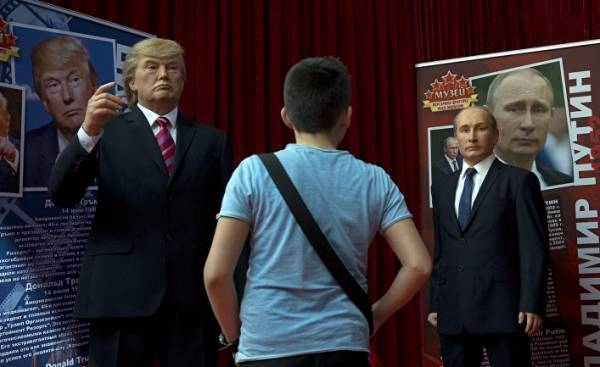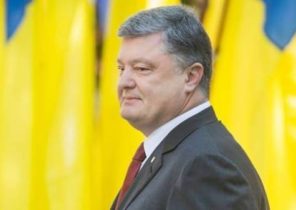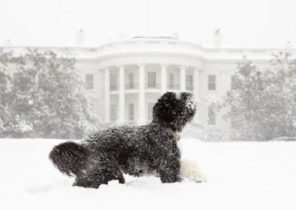
As shown by public opinion polls, conducted in 45 countries during the American election campaign, Russia was the only state where the majority of respondents wanted the electoral victory to Donald Trump, and the preponderance of Russian supporters of trump supporters of Hillary Clinton were huge and amounted to 23%.
The sympathies of the Russians has been already decided by August 2016. According to the survey “Levada-center”, at that time, 35% of respondents wanted to win the Trump, while Clinton was supported by 13%. Many people in Russia continued to support trump, until April of this year. In March of sympathy has reached its climax — 38%, then fell in three times, reaching to the beginning of the second decade of April only 13%. Negative rating rose from March’s 7% to 39%.
Let’s try to analyze this phenomenon.
The first obvious answer is: in the opinion of Russians influenced by the propaganda on state-controlled Russian media, which first took petranovskaya position and devoted to the American elections a tremendous amount of airtime.
The second obvious explanation for the popularity of the tramp in Russia — they openly expressed sympathy to the Russian Federation and the Russian leadership. According to another survey, “Levada-center”, more than half of the polled Russians believed that after the inauguration of the trump of the Russian-American relations will improve.
Of course, the realities of a constantly changing political dispositions have on the assessment of the situation a huge impact, but in the case with the popularity of trump, you need to look at the deeper, values-ethical motivational component, which largely determined the attitude of Russians to current American domestic politics.
Interestingly, petranovskaya sentiment shared by supporters of the Russian regime, and many anti-Putin minded representatives of the layer, which is called “the Russian liberal opposition,” for example, Yulia Latynina and Michael Weller. Consequently, there is reason to believe that a positive attitude trump the current Russian government is not the only cause of its popularity in Russia.
One of the reasons petranovskaya sympathy of the Russian opposition-Westerners, goes back to the time development of the dissident movement in the USSR. This movement was maintained in the West largely by forces from the right side of the political spectrum (in the case of the US Republicans). “Voice of America” and Radio “Freedom” listener in the USSR also often received political information that is right-wing. Politicians, who held a conciliatory stance toward the Soviet Union, were not popular in dissident circles and Omladinskih. On the contrary, had the great popularity of the “hawks” Ronald Reagan and Margaret Thatcher. Many dissidents in the Soviet Union believed that the Western left (and even moderately leftist social democratic party or the us Democrats) poisoned Marxist-Leninist ideology, manipulated “hand of Moscow”. Western leftists, in turn, gave priority to the struggle for human rights in their own countries, and many left-wing intellectuals, in General, negatively assessing the Soviet regime, however, engaged in criticism of capitalism, and often used Marxist and neo-Marxist methodology that the anti-Soviet, were inside the Soviet Union, was unacceptable. The Western human rights movement and its shares (anti-government and anti-war speech) was perceived by dissidents in the USSR, as a rule, negatively with the spectrum of relations that range from light irony to sharp hostility. This attitude is inherited and a significant part of the anti-Putin Russian opposition tend to take the modern Western left-liberal establishment as impregnated with ideas of “socialism.”
And then you should go to the above-mentioned root causes of the sympathies of the Russians to Trump, which need careful cultural, historical, psychological and philosophical analysis. This analysis in this paper will be done only a first approximation.
Paradoxically, in its relation to the West “anti-socialist” part of the Russian liberal (in the Russian sense of the word) the opposition is partially meshed with Putin’s propaganda and, more broadly, the tradition of Russian anti-Westernism since the early Slavophiles and Dostoevsky. They are all talking about the degradation of the West, that the best times of Europe behind. And if for some Russian traditionalists ideal is medieval Europe, the Russian liberals considered the “Golden age” of the West XIX century, 1950-ies and the time of Reagan and Thatcher. The nineteenth century was in the eyes of many Russian liberals the heyday of “classical capitalism” (their ideological counterpart in the modern West are in part right-wing libertarians and anarcho-capitalists). 1950-ies, despite the fact that in the West at that time prevailed antipathetic Russian liberals the idea of the “welfare state”, attract the latter of the socio-cultural side. The same time the neocons are perceived by part of the Russian anti-Putin opposition as a period of uncompromising struggle of the West against the Soviet regime, attempts to bring the business out from under the restrictions of the preceding era, and to eliminate the effects of the partial victory of this multidimensional, do not have generally accepted names cultural phenomena, which are described as “a revolution of the sixties”.
The sixties revolution significantly transformed Western culture, political and social discourse. The results are deeply permeated Western society. Feminism, philosophy and culture of postmodernism, ideas of tolerance and multiculturalism, the rejection of different types of xenophobia, the new aesthetics and the transformation of ethics in the direction of the unacceptability of violence — all these themes that constitute the cultural mainstream of the Western world were initiated or advanced a radical philosophy and art of the 1960-70-ies of the last century.
However, in the Soviet Union, although a similar phenomenon took place, but remained a marginal portion of international subcultures. “The sixties” in Russia, and later in varying degrees dissident-minded intellectuals of the 1970s and 80s, tended to perceive their culture as part of European culture, but from the advanced Western social-political thought, as well as related public debates and processes, was cut off. The result is listed in the previous paragraph themes and values of modern liberal culture of the West was in many respects alien to a considerable part of Russian liberals.
This rejection leads to their more or less pronounced critical attitude towards the “socialist” elements of the EU to the Western left and left-liberal parties and politicians, to the Western human rights movement. Trump, in his pre-election rhetoric challenged these modern values, it seemed to many representatives of Pro-Western anti-Putin opposition is much more acceptable and values close candidate than the “socialist” Clinton.
So, Latynina, welcoming the victory trump said, particularly that last “without missing a beat on the most sore spot the dominant left-liberal ideology” and that “every proposal became the subject of a fierce campaign of persecution of the left”. In the same spirit repeatedly spoke Weller, arguing for example that “what leads to the destruction of your culture, the extinction of your people and your country, cannot be called values” (referring to left-liberal values, against which is trump).
The impression is that if trump chose against Russia rhetoric, like Reagan, he could be the idol of a considerable part of the Russian democratic opposition. In the existing situation many of the anti-Putin public figures to convince the public that trump will not pursue Pro-Russian policy, and will be for the Kremlin, perhaps more uncomfortable politician than Barack Obama, and even Hillary Clinton.
As for anti-Western Russian supporters trump, their motivation varied, whimsical, twisted and can become a subject of careful consideration. Some of the rise to power of trump welcomed as the second after Brekzita victory “traditionalist international.” Some rely on the U.S.’s transition to a policy of isolationism that will untie the hands of the Russian authorities in foreign and domestic policy. Others hope to destabilize the situation inside the United States that will weaken the international position of the latter. Combines many anti-Westerners hope that trump will become the gravedigger of the idea of liberal values, preferring the archaic “real politics” of brute force. Even if trump would be in this situation, a foe for Russia to rollback to the past world in which the West (albeit hostile) would have refused his new humanistic ideals, right-wing Russian antiliberaly would feel much more comfortable.
To the present time the popularity of trump the anti-Western Russian public is falling not only because of some “anti-Russian” actions trump, but as it seems, mainly because trump at the moment cannot overcome the resistance of the left-liberal forces, the citadel of which are journalistic and the academic community. And, therefore, hopes part of the anti-Westerners in the “world conservative revolution” suffer damage.
Anyway, current political upheavals can significantly change the level of support for trump in Russia. However, in his favor will continue to work common Russian cultural background, because as friends and enemies of the West are inclined to reject modern Western values of the post-industrial era. Background this transformirovalsya much slower and not depend on the immediate political reality.







